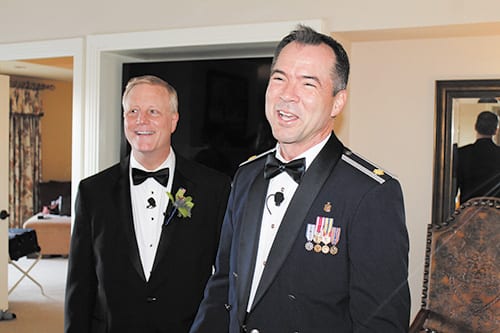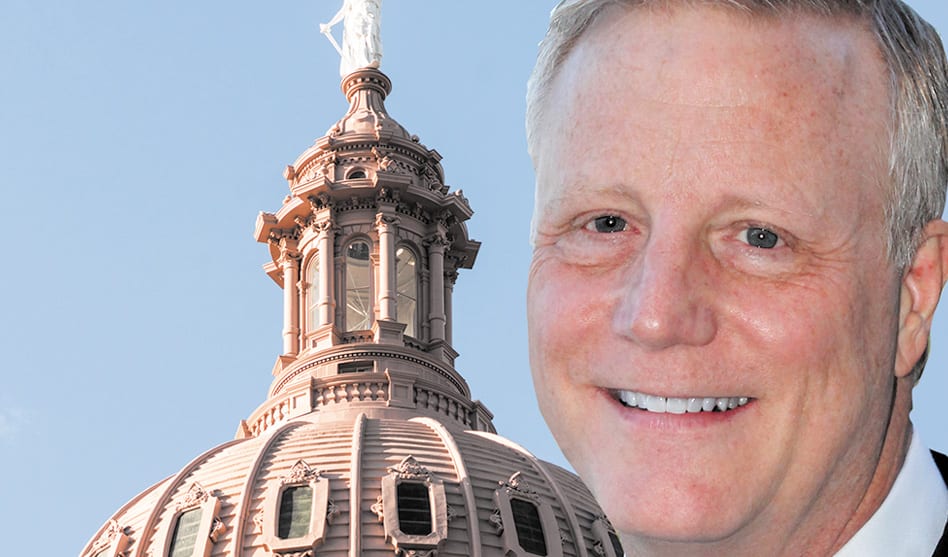Mark Phariss’ suit against Texas taught him a number of lessons he says he’ll use in his race for public office
DAVID TAFFET | Senior Staff Writer
taffet@dallasvoice.com
Mark Phariss said he learned in his fight for marriage equality that Texans are a lot more compassionate, loving and caring than current Texas leaders would have you believe.
“Texans don’t care who I live with or marry, but whether I can do the job,” he said.
The job he was talking about is state senator.
Just before the December filing deadline, Phariss decided to use what he learned during the marriage equality fight as well as some of the name recognition he gained and turn that into a race for an open state Senate seat from Collin County.
“I also learned a little bit how to deal with media,” he said. “That’s not something I’d ever done before. Being in front of a camera petrified me.”
And, he said, he learned to speak on mic to people who didn’t necessarily agree with him in a respectful way, which is a skill he hopes to bring to the Legislature.
The race has gotten a lot of attention since Phariss entered. “Our filing generated a lot of publicity,” he said.
But his two Republican opponents are, arguably, equally well known.
Angela Paxton is the wife of Texas Attorney General Ken Paxton, who held the District 8 senate seat before running for statewide office four years ago. Paxton has been under indictment ever since assuming office. His trial is on hold as Collin County battles against paying the fees owed the special prosecutors in the case.
Angela Paxton’s primary opponent is Phillip Huffines, whose twin brother, Don, holds the District 16 seat just south of District 8 that includes part of Oak Lawn. Don Huffines received a 0 percent rating with Equality Texas and 100 percent by the Texas Right to Life Committee.
At least locally, Phillip Huffines is well known for his car dealerships’ commercials.
Phariss faces one primary opponent — Brian Chaput. Phariss has nothing negative to say about Chaput. In fact, he said he likes Chaput and will endorse him if he wins the primary.
The two have met and agreed to stick to issues during the primary campaign, Phariss said.

Mark Phariss, left, and his husband Vic Holmes.
The issues, as Phariss sees it, are education and transportation, not bathrooms and borders.
“Education and property taxes are linked,” Phariss said. “And I would never have achieved what I have in my life if it weren’t for my public education.”
He said he never has complained about paying property taxes to fund education, “because someone paid for my education,” he said. “But one thing we’re not doing is properly funding education from the state level.”
As state funding has decreased, local taxes have increased to make up the difference. And as the state’s population has soared, efforts to fund new schools and maintain existing — and aging — facilities haven’t kept pace.
Phariss said he opposes vouchers because that simply takes even more money out of the public education system. And he believes people who live in his district agree with him.
“We don’t have failing schools in my district,” he said. “I bought a house in Plano, because I knew the schools were good and that was good for the value of my house.”
He sees transportation issues in the same light as education. Although the population has increased, funding for new roads hasn’t kept pace. And the method of taxation to pay for them hasn’t kept pace, either.
As cars have gotten more fuel-efficient and as more electric and hybrid vehicles have been sold, the gas tax revenue per mile driven has decreased. To make up for that, the state has built more toll roads.
Phariss encourages more public-private partnerships like the proposed high-speed rail project between Dallas and Houston. He said that will replace the need for expansion of I-45 between the two cities and is an environmentally-friendly project.
Phariss said he would also like to see marijuana decriminalized and sentences for marijuana-related offenses decreased. That would free up money spent on incarceration that could then be used to cover rising transportation costs.
Phariss is an attorney with a wide range of experience. He’s been in private practice for himself and has worked as an in-house business attorney.
“I’ve represented a whole slew of industries and have a broad background on how our economy works,” he said.
He believes in policies that ensure a strong middle class. “Historically, other countries that have a huge gap between workers and the wealthy don’t do well,” he said. “We have to maintain our thriving middle class.”
While he believes in working across the aisle and negotiating a deal that benefits everyone, he said some issues “are non-negotiable.” Voting rights is one. No obstacles should be put in the way of any eligible citizen voting, he said.
Bathroom bills are another: “I’m never going to be in favor of a bathroom bill,” Phariss said.
How much should the state pay local school districts to cover the cost of education? That’s negotiable. Phariss would like to see 50 percent. The current funding level is in the 30s. He’d consider it a win for Texas students if that level came up into the 40s.
That, he said, is reasonable compromise. He explained by discussing the marriage equality case.
Although Phariss and husband Vic Holmes, along with co-plaintiffs Nicole Dimetman and Cleo DeLeon won their case, Phariss said he never wanted to change what anyone believes or force their churches to change their basic beliefs.
“I simply disagree, and they and their churches can continue to believe as they please,” he said. “We just wanted the state, not the church, to recognize our marriage.”
Ironically, Phariss said, he’s a Methodist, a mainstream denomination that still doesn’t recognize same-sex marriages or officially ordain gay or lesbian clergy.
“I probably should be working within my church on that,” he said, laughing, but not quite serious about mounting another marriage equality fight.











